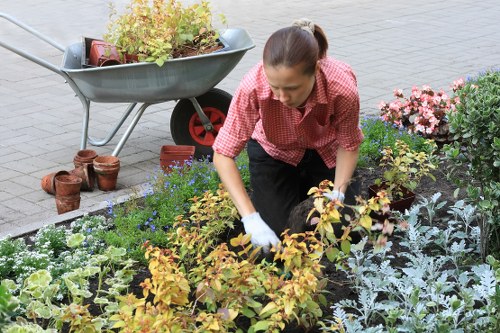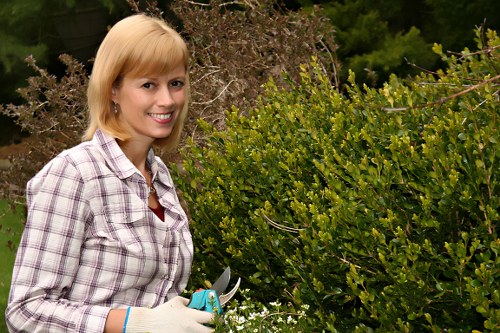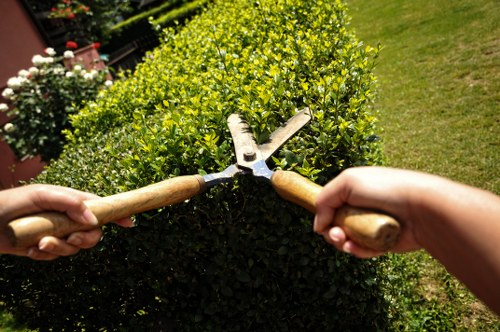Hedge Trimming in Wimbledon: Enhancing Your Garden's Beauty

Maintaining a beautifully trimmed hedge is essential for enhancing the aesthetic appeal of any garden. In Wimbledon, where gardens are not just spaces but reflections of personal style, hedge trimming plays a pivotal role in garden maintenance and design.
Whether you have a sprawling estate or a cozy backyard, regular hedge trimming ensures your plants remain healthy, vibrant, and well-shaped. Properly trimmed hedges can serve as excellent privacy screens, windbreaks, and even provide habitats for local wildlife.
Understanding the best practices for hedge trimming in Wimbledon is crucial for achieving the desired look and longevity of your hedges. This article will guide you through the essentials of hedge trimming, the benefits, and tips to maintain your garden's greenery.

Why Hedge Trimming is Important
Regular hedge trimming is more than just an aesthetic choice; it fosters the overall health and growth of your plants. Trimming helps in:
- Promoting Healthy Growth: Removing dead or diseased branches encourages new growth and prevents the spread of diseases.
- Maintaining Shape: Well-trimmed hedges maintain a desirable shape, enhancing the garden’s visual appeal.
- Enhancing Sunlight and Airflow: Trimming allows more sunlight and air to reach the inner branches, promoting healthier foliage.
- Controlling Size: Keeps the hedge at a manageable height and width, preventing it from becoming overgrown.
In Wimbledon’s climate, where seasonal changes can impact plant health, timely hedge trimming is essential to ensure your greenery withstands the elements and thrives throughout the year.

When to Trim Your Hedges
Optimal Seasons for Trimming
The timing of hedge trimming is crucial to ensure the best results. In Wimbledon, the ideal times to trim your hedges are during:
- Late Spring: After the initial growth period, typically in late May, allows the hedge to recover and grow before the winter months.
- Early Autumn: In September or October, trimming provides a clean shape before the hedge goes dormant for the winter.
Avoid trimming during the peak of summer or winter, as extreme temperatures can stress the plants and hinder proper healing.
Frequency of Trimming
The frequency of hedge trimming depends on the type of hedge and its growth rate. Generally:
- Fast-Growing Hedges: May require trimming multiple times a year to maintain their shape.
- Slow-Growing Hedges: Annual trimming is usually sufficient.
Regular observation of your hedges will help determine the best trimming schedule to keep them healthy and well-maintained.

Tools and Techniques for Effective Hedge Trimming
Essential Tools
Having the right tools is fundamental for efficient hedge trimming. Essential tools include:
- Pruning Shears: For precise trimming of smaller branches.
- Hedge Trimmers: Electric or manual trimmers for larger areas and thicker branches.
- Loppers: For cutting through tougher branches.
- Protective Gear: Gloves, safety glasses, and sturdy footwear to ensure safety during trimming.
Investing in quality tools will not only make the trimming process easier but also ensure cleaner cuts that promote faster healing.
Trimming Techniques
Effective trimming techniques include:
- Maintain Shape: Follow the natural shape of the hedge, whether it’s formal, rounded, or natural.
- Cut Strategically: Make cuts at a slight angle to prevent water accumulation, which can lead to rot.
- Step Back Regularly: Frequently step back to assess the overall shape and make adjustments as needed.
- Don’t Over-Trims: Avoid removing more than one-third of the hedge’s growth in a single trimming session to prevent stress.

Choosing the Right Plants for Your Wimbledon Hedge
Popular Hedge Plants in Wimbledon
Selecting the appropriate plants is key to a successful hedge. Some popular choices in Wimbledon include:
- Boxwood: Known for its dense foliage and ability to be trimmed into various shapes.
- Yew: Evergreen and highly versatile, ideal for both formal and informal gardens.
- Privet: Fast-growing and excellent for creating thick, opaque hedges.
- Holly: Provides both aesthetic appeal with its glossy leaves and berries, as well as excellent privacy.
Consider factors such as growth rate, maintenance level, and seasonal changes when selecting plants for your hedge.
Adaptability to Wimbledon’s Climate
Wimbledon experiences a temperate climate, which means it’s important to choose hedge plants that can withstand its seasonal variations. Opt for plants that are:
- Frost-Tolerant: To survive the colder months.
- Drought-Resistant: To handle periods of low rainfall.
- Shade-Tolerant: If your hedge is placed in a less sunny area of your garden.
Proper plant selection ensures your hedge remains healthy and attractive year-round.

Professional Hedge Trimming Services in Wimbledon
Benefits of Hiring Professionals
While DIY hedge trimming is possible, hiring professional services offers numerous advantages:
- Expertise: Professionals have the skills and knowledge to trim hedges correctly, promoting healthy growth.
- Efficiency: Experienced trimmers can complete the job faster and more effectively.
- Safety: Professionals are trained to handle tools safely, reducing the risk of accidents.
- Equipment Access: Access to high-quality, specialized equipment ensures superior results.
Investing in professional hedge trimming services can save you time and ensure your garden looks its best.
Choosing the Right Service Provider
When selecting a hedge trimming service in Wimbledon, consider the following:
- Experience: Look for companies with a proven track record in hedge trimming.
- Reviews: Check customer reviews and testimonials to gauge satisfaction levels.
- Pricing: Compare quotes to ensure you’re getting fair rates for the services provided.
- Insurance: Ensure the company is insured to protect against any potential damage or accidents.
Choosing a reputable service provider ensures quality workmanship and peace of mind.

Maintaining Your Hedge Between Trimmings
Regular Inspection
Consistent monitoring of your hedge helps in identifying issues early. Look for signs of disease, pest infestations, or damage caused by weather. Prompt action can prevent minor problems from escalating.
Proper Watering and Fertilizing
Ensure your hedge receives adequate water, especially during dry spells. Fertilizing in the growing season promotes robust growth and helps the hedge recover from trimming.
Weed Control
Weeds can compete with your hedge for nutrients and water. Regularly removing weeds around the base of the hedge keeps it healthy and prevents unwanted growth.

Environmental Benefits of Well-Trimmed Hedges
Supporting Local Wildlife
Hedges provide habitats for various species, including birds, insects, and small mammals. A well-maintained hedge offers shelter and food sources, contributing to local biodiversity.
Air Quality Improvement
Hedges act as natural air filters, trapping dust, pollutants, and providing oxygen through photosynthesis. Maintaining healthy hedges enhances their ability to improve air quality around your home.
Climate Regulation
Strategically placed hedges can moderate temperatures by providing shade in the summer and windbreaks in the winter, contributing to a more comfortable outdoor environment.

Cost Considerations for Hedge Trimming in Wimbledon
Factors Affecting Costs
The cost of hedge trimming can vary based on several factors, including:
- Hedge Size: Larger hedges require more time and resources to trim.
- Hedge Type: Some plants are more challenging to trim and may require specialized tools or expertise.
- Accessibility: Hedges that are difficult to access may increase the cost due to the need for specialized equipment.
- Frequency: Regular maintenance contracts may offer better rates compared to one-time services.
Understanding these factors can help you budget appropriately for your hedge trimming needs.
Comparing DIY vs. Professional Services
While DIY trimming can save money initially, it may incur hidden costs such as tool purchases, time investment, and potential plant damage. Professional services, though potentially more expensive upfront, often provide better results and save you time, making them a worthwhile investment.

Seasonal Hedge Trimming Tips for Wimbledon Gardeners
Spring Trimming Tips
- Trim hedges in late spring to encourage new growth.
- Remove any winter damage and shape the hedge for the upcoming growing season.
- Apply a balanced fertilizer to support healthy development.
Autumn Trimming Tips
- Perform light trimming in early autumn to maintain shape before dormancy.
- Clear away fallen leaves to prevent mold and fungal growth.
- Protect hedges from frost by mulching around the base.
Winter and Summer Care
In winter, minimize trimming to prevent stress on the plants. During summer, ensure adequate watering and monitor for pests, trimming only as needed to maintain health and appearance.
Common Mistakes to Avoid in Hedge Trimming
Over-Trimming
Removing too much of the hedge at once can stress the plant, leading to poor growth and increased susceptibility to disease. Aim to trim no more than one-third of the hedge’s volume in a single session.
Incorrect Timing
Trimming at the wrong time of year can hinder the hedge’s growth cycle. Ensure you trim during the recommended seasons to promote optimal health.
Poor Tool Maintenance
Dull or dirty tools can cause ragged cuts, making the hedge more vulnerable to pests and diseases. Regularly sharpen and clean your tools for the best results.
Neglecting Safety
Ignoring safety precautions can lead to accidents. Always wear protective gear and follow proper safety guidelines when trimming hedges.
Innovative Hedge Trimming Designs
Formal Hedges
Formal hedges are characterized by their precise, symmetrical shapes. They're ideal for creating structured garden layouts and enhancing the elegance of your outdoor space.
Naturalistic Hedges
For a more relaxed and organic look, naturalistic hedges follow the inherent growth patterns of the plants. This style promotes biodiversity and a more serene garden ambiance.
Topiary Hedges
Topiary involves shaping hedges into intricate and artistic forms, such as animals, geometric shapes, or abstract designs. This technique adds a unique and artistic element to your garden.
Mixed Species Hedges
Combining different plant species in a hedge can create a dynamic and diverse garden feature. This approach enhances visual interest and supports a wider range of wildlife.
Eco-Friendly Hedge Trimming Practices
Using Sustainable Tools
Opt for eco-friendly tools, such as electric or battery-powered trimmers, to reduce your garden’s carbon footprint. Regular maintenance of tools also ensures longevity and efficiency.
Composting Clippings
Instead of disposing of hedge clippings, consider composting them. Composting enriches your garden soil, promoting healthier plant growth and reducing waste.
Water Conservation
Implement water-saving techniques, such as drip irrigation or rainwater harvesting, to ensure your hedges receive adequate moisture without overusing resources.
Promoting Biodiversity
Maintain diverse plant species within your hedge to support various forms of wildlife, enhancing the ecological balance of your garden.
Final Thoughts on Hedge Trimming in Wimbledon
Hedge trimming is a vital aspect of garden maintenance that enhances both the beauty and health of your plants. In Wimbledon, where gardens are cherished spaces, maintaining well-trimmed hedges can significantly elevate the overall appearance and functionality of your outdoor area.
By following the best practices outlined in this guide, investing in the right tools, and considering professional services when necessary, you can ensure your hedges remain a stunning feature of your Wimbledon garden all year round.
Enhance your garden’s beauty today. Contact us today to book your hedge trimming service and experience the difference a well-maintained hedge can make.

